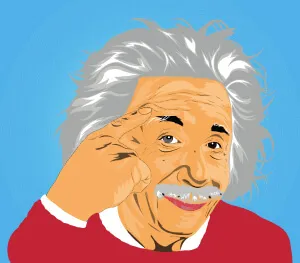Even when we look at the 2% population with the highest IQ of the entire planet, we find a myriad of professions that tell us that not every genius is a scientist or a business executive. If we equate success with money, there are many factors that influence our financial fate: one is intelligence, but our socioeconomic background and personality traits correlate as much as IQ.
Imagine an elite intellectual association with strict entry requirements extending all over the globe regardless of nationality, ethnicity, or politics. Only the chosen ones can participate and become members… What does it sound like? The Illuminati? A mysterious club straight out of a Dan Brown novel? None of those. We are talking about a society that exists in real life. It’s called Mensa and has one and only admission criteria: belonging to the 2% population with the highest IQ. Now let’s think for a moment. We have roughly 145 000 people catalogued as the most intelligent in the world... the first obvious questions are: how are they? Are their gatherings as in The Big Bang Theory? Are they more successful than the rest of us mortals?
A crucial point here is what each of us considers success and how we measure it. This abstract concept is a very personal view of the world, whose criteria largely relate to our social, political, and educational background. Moreover, it might change over time, as we grow older and accumulate different experiences. But… let’s be honest, success in our capitalist society usually involves status and money. A number of scholars have evaluated the relationship between IQ and socioeconomic achievement. Success here is defined as the sum of education (highest academic level completed), occupation (using scales that evaluate job prestige), and income (i.e., salary). The studies involve measuring the IQ of children and following them for a minimum of 10 years up to 50!—we have to admit that psychologists are endowed with the gift of patience.
Results show that intelligence is correlated with success to a different extent. While IQ is a good predictor of academic achievement and profession, revenues are a different story. They tend to go together, but the association is not very strong.
This might not come as a surprise. If IQ were the only determining factor to become rich, only the finest minds would be wealthy. I am sure we can all think of examples that prove that theory wrong. The world is—spoiler alert!—not strictly meritocratic. Individual abilities, as studies have shown, can indeed foretell what depends on the person, such as job performance. However, there are other variables that can account for our income. Our starting points largely depend on where we were born. Investigations have demonstrated that social background influence our future salary as much as our intelligence. After all, the resources and opportunities vary depending on the socioeconomic status of our parents.
Given that IQ is partly determined by our genetics (as we explain in the IQ & genes article), and we cannot control the economic background we are raised in, can we actually influence our financial fate? Academic performance might give us the first hint. Looking at grades is not the same as measuring IQ. Here, aspects such as school-related learning and motivation come into play. Those factors, that can actually be modified and improved, give a moderate correlation between grade point average (GPA) and salary. Yet, we fail to find a unique aspect that can reliable predict economic success.
Balancing the odds
Now, for the sake of discussion, let’s imagine that we can equalize the previous variables. Let’s study three notorious intellectuals, with access to education, and economic backing. Will they all turn out to be wealthy?
Directly from Italy, he has served as inspiration for writers, painters, singers, and sculptors. His legend has grown unceasingly over centuries. His most famous painting remains the center of attention at the Louvre. Yes, we are talking about Leonardo Da Vinci. Despite representing the pinnacle of art and invention, current standards would classify him as a master procrastinator. He had a low tolerance for boredom and took on too many projects simultaneously, sometimes abandoning them just after conceptualization. His perfectionism discouraged him from declaring a painting finished, which led to undelivered works. With such a reputation, let’s say no company would name Leonardo employee of the year.
Nikola Tesla was a serbian-croatian inventor. The modern world pretty much runs on his electricity generation ideas. He turned Niagara Falls into an electric-generating plant. Despite having influential sponsors and a golden period in which he was considered one of the greatest engineers of his time, his eccentric personality and exaggerated claims about possible inventions led him to be considered as a ‘mad scientist’. His ideas were the basis for developing remote control, radar, or robotics. However, he died almost penniless.
The person listed as having the highest IQ of all times, who entered the Guinness Book of Records for such achievement is the US writer Marylin vos Savant. She is a mathematician, lecturer, and columnist who started writing ‘Ask Marylin’ in 1986, after being included in the world’s famous ranking. In this Sunday section of the Parade magazine, she answers questions on various academic subjects, solves puzzles and gives self-devised quizzes. If you want to get a solution to a long-lasting enquiry, you can still forward it to her. She has indeed profited from her intellect! Forbes estimates her net worth in 15 billion dollars.
So will IQ predict higher income? The average income of high IQ groups is superior to the average, but analysis of data has shown that when comparing the ones with greater revenues with those earning the lowest, the main difference is personality traits. Those in the top part show greater will power, perseverance, and a desire to excel. This suggests that, while IQ does play a role in life success, personality traits are also a determining feature. Better outcomes seem strongly linked to ‘doing’. As Picasso once said ‘action is the foundational key to all success’.
How do intelligent people make a living?
With all this information, let’s come back to the Mensa folks. Would you be able to guess which type of jobs geniuses have? Whereas in high IQ cohorts some people become doctors, scientists or business executives, reports show that others pursue more common occupations such as police officers, truck drivers, or glassblower... So what happens with these tremendously gifted people with more humble jobs? Haven’t they reached their ‘full potential’?
Financial and material triumphs can be considered as hallmarks of success. Nonetheless, there is another side to the coin. Wealth, fame, and beauty are what psychologists call extrinsic goals. Tendency towards activeness has been fundamental at various points of history for acquiring shelter, safety, and food. Yet, in consumerists economies our objectives are built on social and interpersonal comparisons. This can become very dangerous. As people’s material values increase, they tend to compare themselves to new social groups. If I already have a yacht, what I now need is a jet, because, you know, my neighbor has one. Therefore, our extrinsic goals are perpetually out of reach. This endless circle can severely affect our wellbeing. That is ‘the dark side of the American dream’ .
In contrast, intrinsic aspirations are those oriented to personal growth, close relationships, community giving, and physical health. Those objectives fulfill basic psychological needs and can actually activate reward centers in our brain. As you may have guessed, studies have linked these objectives with happiness. So what if… those intellectuals with more humble occupations have actually understood life? What if they have made—consciously or unconsciously—the choice of focusing on what was better for their wellbeing?
Of course nothing is black or white. One needs a certain level of money to access what our ancestors sought: shelter, safety, and food. Each of us is different and needs a certain balance between extrinsic and intrinsic goals to have a sense of meaning and purpose. However, time is finite and if you have to choose between one or the other, studies strongly support to focus on you rather than your status. After all, Da Vinci’s greatest contributions were born from his unique ‘talent stack’ and reluctance to focus on one thing. Tesla’s ‘crazy ideas’ laid the foundations for building robots, something even he did not anticipate. Marylin herself has stated that IQ don’t measure many aspects that intelligence entails. Being smart might also mean to do the best for you.
.png)






.png)


